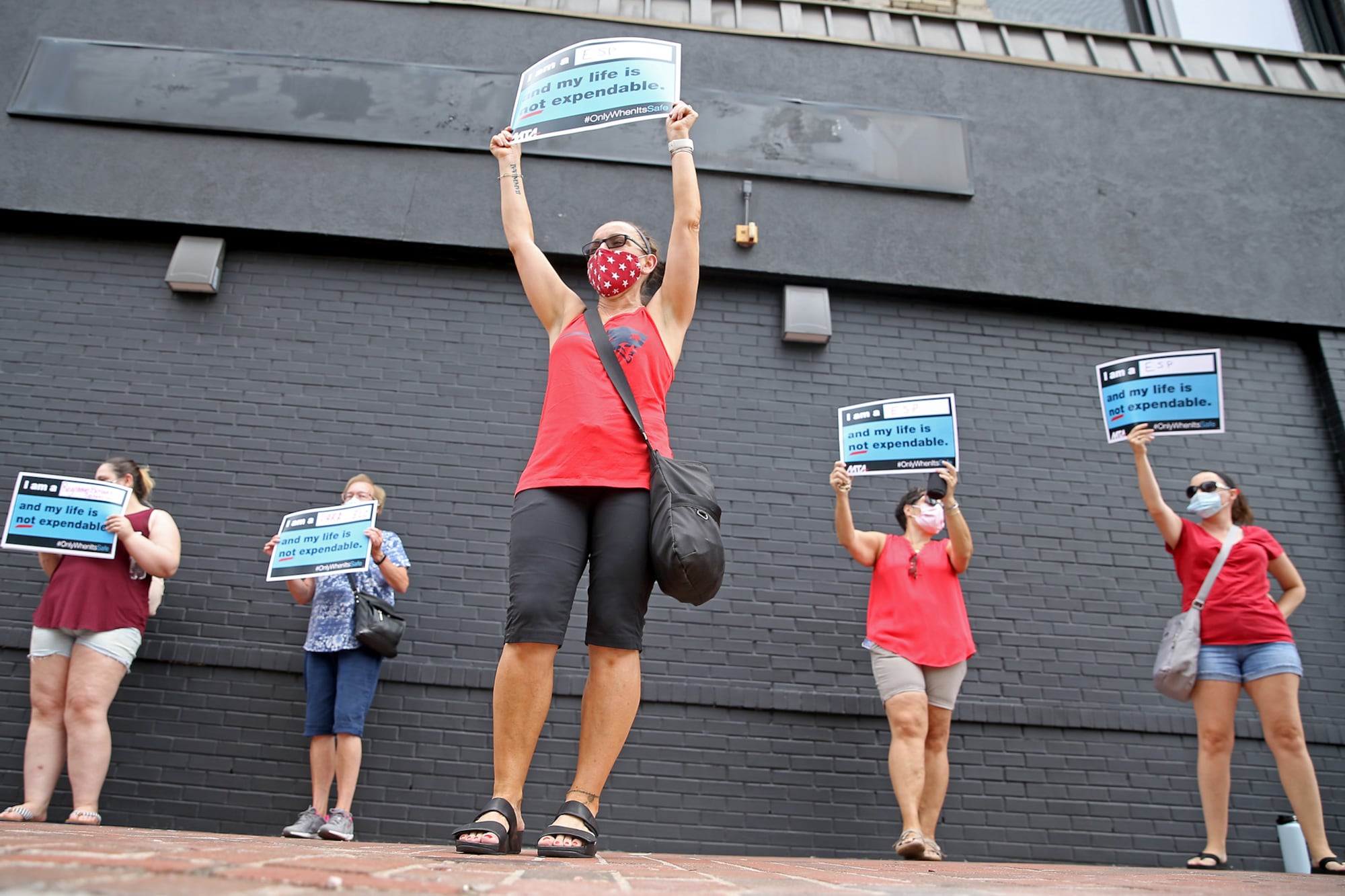Educators in several cities rallied on Monday during a national day of action to call attention to their concerns about reopening schools as coronavirus cases continue to rise in many parts of the country.
Though educators have held protests in recent weeks, Monday’s event marked the first unified show of force as teachers and their unions continue to play an increasingly vocal role in the debate over when and how schools should reopen.
“I do not want to be the sacrificial lamb, because you’re forcing us to go back into an environment that is dangerous,” said Andrea Parker, an elementary school teacher in Chicago, where many teachers rode in a car caravan from the teachers union’s headquarters to the city’s downtown.
Teachers in some of the nation’s largest school districts participated in the demonstration, including Chicago and New York City, as well as Boston, Denver, Milwaukee, and others.
All of this is happening amid a larger national conversation about what students will need in order to learn this fall, what teachers and other staff will need to feel protected, and what schools can reasonably provide — both in places where soaring coronavirus caseloads have made it impossible to reopen schools, and in places like New York and Chicago, which are not considered virus “hot spots” and are considering some in-person learning.
The demonstrations come shortly after the nation’s second-largest teachers union, the American Federation of Teachers, said it would support protests, lawsuits, and strikes over educator safety. Already, Florida’s teachers union has sued the state’s governor and education commissioner over an order to reopen schools five days a week for in-person instruction.
Some of the common demands for the day of national action, according to a website set up to promote the event, included keeping schools closed “until the scientific data supports” reopening them, providing schools with resources like protective equipment and cleaning supplies, and providing more equitable access to online learning — a necessity as many school districts have decided they will begin the school year virtually.
Teachers also included demands unique to their cities and states.
Milwaukee teachers, for example, tacked demands to the door of the state’s education agency that included a statewide order to keep school buildings closed and an end to standardized testing. Last year, the U.S. Department of Education allowed every state to skip their annual tests, but officials have indicated they’re not likely to do that again this year.
In Chicago, teachers drew attention to their demand to begin the school year remotely, as the school district continues to plan some in-person instruction.
Though contact with a contaminated surface doesn’t appear to be the main way that the coronavirus spreads, schools will still be expected to take on additional cleaning measures — especially if a student or staff member shows up to school sick and a classroom needs to be disinfected.
This has left many educators worried about school cleanliness, especially in cities like Chicago where that’s been a longstanding concern. At the day of action, some teachers said they feared that the additional custodians the Chicago school district has pledged to hire won’t be enough, and that not every school has good ventilation — something many schools across the country are trying to change in an attempt to stop the virus from lingering in the air.
“Cleanliness is not in every single school,” said Maximilian Cole, a special education teacher at Chicago’s Manley Career Academy High School. “That is a problem.”
Many school districts are pushing Congress for more federal dollars to help them cover new coronavirus-related costs. The latest Republican-backed coronavirus relief package contains $70 billion for K-12 schools, but a majority of that money would be tied to physically reopening schools.
In Denver, where students will start the school year remotely, teachers gathered and taped red balloons to their cars — though they blew them up inside their vehicles to avoid breathing too hard on anyone.
They announced an effort to meet virtually with 500 families by the end of the week to hear their concerns about the fast-approaching school year. Their goal is to bring those concerns to district, city, and state officials and advocate for creative solutions.
“Educators appreciate that the district moved back our start date for in-person learning,” said Tiffany Choi, a high school French teacher who heads Denver’s teachers union. “We look forward to working with the district to identify evidence-based metrics for a safe return to school, and to discussions of safe working conditions.”
Seventy miles away in Colorado Springs, educators from a number of school districts held a public will-signing event to highlight their concerns about returning to school. Most districts in the surrounding county are planning to hold classes in person.
Meanwhile, the state teachers union, which hosted the Denver teachers in its parking lot for Monday’s demonstration, has been calling for a remote start to school and for the state to set a threshold for when it’s safe to hold classes.
“The state needs to be providing more clarity, so we can have some consistency,” said Amie Baca-Oehlert, the head of the Colorado Education Association. “There is no place that educators would rather be than back in our classrooms, but we want to do that when it’s safe.”






